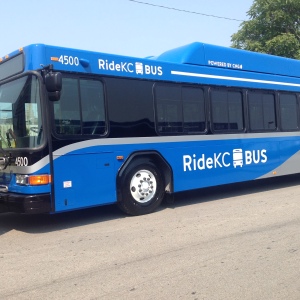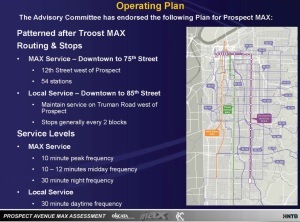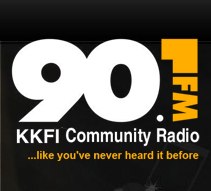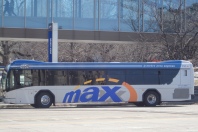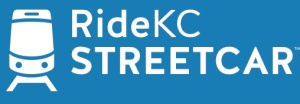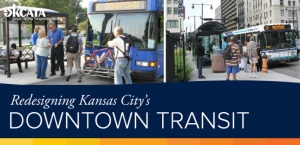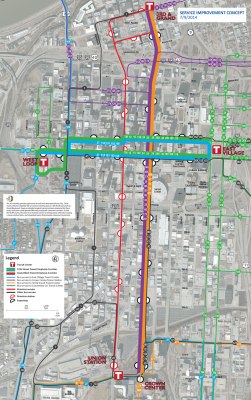
After 6 years and several city councils you would think KCMO would finally obey the transit funding law it passed in 2010, Ordinance 130796. Instead we have another submitted budget and current fiscal expenditures that fail the will of the voters, ignores the needs of riders, and rips off the bus system. If the city gave the buses half the love it gives the streetcar, riders would have a much better, bigger service. After all, that is what the city promised every time the voters passed the additional 3/8 cents Transit Sales Tax to supplement the ½ cent Transportation Sales Tax. KCATA was going to get all of the money to build that elusive bigger better bus system. Instead the net effect is at least 1/8 of a cent in sales taxes going to roads and the streetcar even though that wasn’t what people voted for. KCATA is not getting close to the 7/8 cents taxpayers are paying with these two sales taxes. In fact for several years after the recession, although there were plenty of sales taxes and service was severely cut, the city made KCATA use its reserve account to pay bills, so the city could shift money to roads.
Combining service cuts in 2009 and 2010, KCATA cut service levels over 10% during the recession. KCMO left the bus service decimated and the service has not been restored. KCMO’s policy of yearly diverting millions of dollars to roads and the streetcar has a very negative impact on the bus service. In city hall there is a blatant disregard for the rule of law, riders needs and the will of the voters.
Now the city administrator boosts in the budget letter, that he has fully funded KCATA. He fails to tell you that they are barely paying for the reduced service level left over after the recession.
The city has bleed the 1/2 cent Transportation Sales Tax dry using up all the recovery money for roads and ignoring a 2010 ordinance that would have made KCATA whole again by giving at least 95% of the ½ cent Transportation Sales Tax revenue to the buses. Adding a few late night buses this year to coordinate with the KC Streetcar is nice, but it is a long way from restoring service to pre-2008 service levels. Future revenue increases may be smaller than the last few years, so the recovery windfall that would have allowed restoration of bus service in a reasonable time-frame has probably been squandered.
This current level of service is certainly NOT why people voted for an additional 3/8-cent sales tax. City promises are broken, laws ignored and a significantly bigger better bus system is still a dream. Outside of a very narrow area, riders can’t get home on the bus at night from restaurant or retail jobs. Riders still have hour-long waits on a lot of routes. Service levels certainly haven’t blossomed up north. These problems are all a function of money and as long as the city diverts the money meant to grow the system and brags about barely funding the buses, don’t expect much growth.
Would you have voted for a 3/8 cent increase in sales taxes for the buses if you knew the buses weren’t going to get the 7/8 cents combined sales taxes? The city did a “Bait and Switch” leading to a defacto tax increase for roads. Besides the ethical problems with this process, the city keeps ignoring the law that says 95% of the ½ cent Transportation Sales Tax (after 3 deductions, one of which is $2.1 million to help pay for the Streetcar) is supposed to go to KCATA.
 Giving KCATA at least 95% of the sales tax revenue would only leave a maximum of 5% of the sales tax revenue for Public Works/roads. That is about $1.5 – $2 million yearly. The city can NOT legitimately say it is following the ordinance when they give $9.5 million to Public Works this year and plan to give them $5 million next year? It is a scam, but since most people don’t look at the current fiscal year or question the huge amount going to Public Works when the submitted budget comes out, they miss what the city is really doing. We keep raising this issue, but the Council and the Mayor are complicit.
Giving KCATA at least 95% of the sales tax revenue would only leave a maximum of 5% of the sales tax revenue for Public Works/roads. That is about $1.5 – $2 million yearly. The city can NOT legitimately say it is following the ordinance when they give $9.5 million to Public Works this year and plan to give them $5 million next year? It is a scam, but since most people don’t look at the current fiscal year or question the huge amount going to Public Works when the submitted budget comes out, they miss what the city is really doing. We keep raising this issue, but the Council and the Mayor are complicit.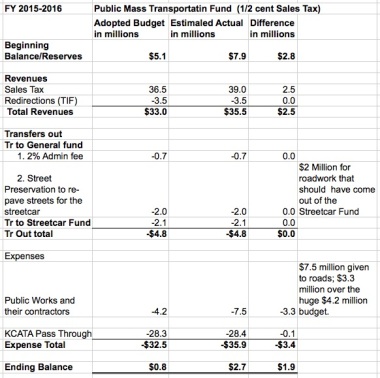
Here is how it works. The beginning balance is so large because the city low-balls the budget the previous year and then fails to give KCATA the increased revenue, so it flows through to the beginning balance for the next year. Then they divert the money to roads and the Streetcar. See how the city spent $9 million on roads this fiscal year, while claiming to obey the ordinance. It may look even worse once we get the final Actual numbers next year.
Why does the city keep shorting KCATA? What causes the city council to under fund the bus system in violation of the Ordinance? We visited with all the new council people on the Transportation and Infrastructure committee and Justus and McManus are both on the finance committee as well. They can’t say they aren’t aware of the situation. Huge amounts of this bus money goes to pay for road work by the Heavy Constructors Union, which usually makes big contributions to campaigns, like the last city earnings tax vote.
It is a shame that taxpayers and riders keep getting the shaft and their vote for more transit continues to be ignored by city hall. Voters did NOT vote for more roads with the 3/8 cent Transit Sales Tax. The city promised they would NOT do exactly what they have been doing, which is divert the ½ cent Transportation Sales Tax away from the buses. Even after they passed the ordinance the city continues to ignore the law and take the money for roads.
Just how much money are we talking about being diverted? Million of dollars every year!
The ½ cent Transportation Sales Tax (Public Mass Transportation Fund – Budget page 384) has a LAW, city ordinance 130796, that says the KCATA is supposed to get 95% of the available funds (after the 3 deductions). This calculation is a simple subtraction and multiplication exercise. Any grade school kid with a calculator can do this, but the city never gets it right. They constantly short KCATA by millions of dollars.
How much was KCATA shorted in just the last three years based on the ordinance
- Actual FY14/15 $6.0 million
- Estimated FY15/16 $2.6 million
- Submitted FY16/17 $900 thousand
The previous two years the amount is off so much because the city refuses to give KCATA the 95% of the actual available sales tax proceeds. Instead, they force KCATA to keep the low-ball budgeted amount and all increase from the recovery is siphoned off to roads the next year. This practice goes against generally accepted accounting principles, where accounts are adjusted to actual costs during the year. The accounting department exists to record the real revenue and expenses and make any adjusting entries as needed. The rest of the accounts are adjusted, but not KCATA’s payment. So we believe this practice violates the ordinance and is unlawful.
 In the submitted budget, KCMO insists it is following the ordinance this year, so we asked the budget director for a reconciliation of the $900K they are short. His explanation is very interesting but he hasn’t answered our questions raised by his reconciliation.
In the submitted budget, KCMO insists it is following the ordinance this year, so we asked the budget director for a reconciliation of the $900K they are short. His explanation is very interesting but he hasn’t answered our questions raised by his reconciliation.
TAN agrees through the 95% calculation, but we have serious doubts about two of the other three budget entries.
Let’s start with #3, Street Preservation, which we agree with. KCMO Public Works Department does work for KCATA throughout the year. They will upgrade bus platforms around bus stops and various other small projects. KCATA owes the city money for this work, but instead of KCATA writing a check, the city has decided to reduce the pass though amount. This amount should be adjusted to actual cost throughout the year.
We have problems with #1 and #2 though.
#1 KCMO has a bus pass program. This year they owe KCATA $174,000 for bus passes for all city employees for the year. We think this is a great program. However, the city owes KCATA money, so why is it being subtracted from the amount paid to KCATA? The city should be increasing money to KCATA not decreasing. We have asked for an explanation, but the city has gone silent.
#2 The $555 thousand entry for Transit Operations remains a mystery, although we have asked repeatedly for an explanation. TAN is not aware of any other work the city does for KCATA like the bus platforms, so what does this represent? KCATA does have at least one contract to provide additional transit services to KCMO, which is related to the streetcar, but again that would be an increase not a decrease to the KCATA payment. Plus, if this item is streetcar related, the expense should be in the Streetcar Fund, not the bus money fund. We hope it isn’t streetcar related, but the city needs to explain.
So until the city can provide believable explanations about these adjustments, we stand by the statement that they are shorting KCATA in the Submitted Budget.
In addition to the city’s refusal to adjust the ordinance calculation using actual revenue, there are several other questionable accounting practices.
The city often underestimates the revenue forecast so the calculation for KCATA’s budgeted amount comes in too low. For instance last year’s adopted budget for revenue was $36.5 million. The estimated actual amount is now $39 million, but KCMO refuses to adjust what it owes KCATA, since this is the extra money they keep for roads.
The city plays an accounting game of smoke and mirrors, hoping to hide what it is doing and claiming it is fully funding KCATA. Giving KCATA enough money to barely cover a decimated service level is not the same as giving KCATA the sales tax proceeds people are paying to build a better system.
The ordinance says KCATA gets at least 95% of the PROCEEDS not the budgeted amount. Why does the city administrator refuse to give this money to KCATA? Mr. Schulte believes that any revenue received over his lowball budgeted amount for KCATA is his to give to roads. So of course he is motivated to underfund, some say cheat, KCATA and every year there are millions of additional sales tax dollars, which he takes for roads using this accounting practice. We believe this practice is unlawful based on the ordinance and we have complained to the city lawyer.
The City Administrator seems to be happy if the buses barely limp by, as long as he can work on roads and the streetcar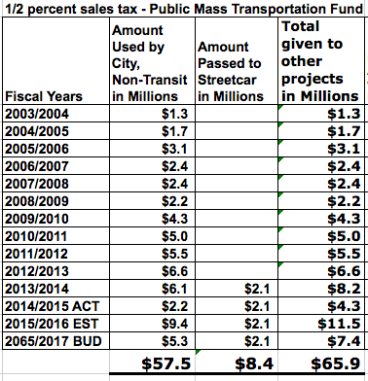
Where has the money gone instead? Since the additional 3/8 cent Transit Sales Tax was passed in 2003, the city has diverted over a years worth of transit to roads, $57.5 Million, and $8.4 million for the streetcar from the ½ cent Transportation Sales Tax. That amounts to $65.9 million dollars that has NOT gone to the buses. So don’t wonder why the buses don’t go where or when you need them, or why you have to wait an hour for the bus. The city refuses to give the buses the right amount of money based on what you are paying in sales taxes.
For your information, there is a problem with the 3/8 cent Transit Sales Tax too. The 3/8 cent Transit Sales Tax (KCATA Sales Tax Fund – Budget page 370) is 100% dedicated to KCATA by LAW, so why does the city keep holding such a large reserve? $1 million is plenty to cover a shortfall, and $1.5 million is very conservative. Here are the ending balances (reserves) for the last 3 years. (Budget Page 370)
- Actual FY14/15 $5.9 Million
- Estimated FY15/16 $4.3 Million
- Submitted FY16/17 $4.3 million
This ending balance amount is excessive and one way the city harasses KCATA by withholding funds. They do not divert money from this fund to roads, they just hold on to it way too long for no valid reason. We raised this same issue last budget and the council finally gave KCATA another $3 million. Why can’t they do the budget correctly in the first place? The submitted budget needs to be changed and the KCATA payment increased by another $3 million.
Make no mistake that the city’s actions have long-term and permanent negative impacts for riders, KCATA and transit service.
- During the recovery the city forced KCATA to use over $17 million of its reserves to pay the bills for this reduced service level, even though most of those years there was sufficient money to pay for the bus service in the ½ cent Sales Tax fund if the money hadn’t been diverted to roads. The KCATA reserve amount has no way to be replenished. It was a one time windfall of money set aside when the 3/8 cent sales tax started, before they received new buses and service could be started. This permanent loss of money didn’t create any new transit benefits, as intended, except to keep the buses running when the city refused to fully fund the service.
- The loss of all the recovery money is another permanent loss to KCATA. All of the excess funds paid to Public Works for road work can’t be used to rebuild the 10% service reductions. It will be a very slow rebuild since all of that money was diverted.
- The city’s decision to take over $2 million yearly from the bus funding for the streetcar continues to hurt the buses. The Streetcar Fund (Budget page 389) has nearly $8 million in the ending balance for FY16-17. As streetcar expenses move from construction to operations, let’s hope the city reduces the amount of money taken from the buses, before it lower taxes and assessments in the TDD. Also, let’s hope that the city starts to charge the streetcar fund for all its expenses instead of taking additional streetcar related expenses from the bus money. These transactions are all permanent loses to KCATA and the bus service.
TAN is very aware that KCATA will put its best foot forward and it is trying hard to reorganize and redefine itself. KCATA has made significant strides forward in the last couple of years. We would like to see the city act as a positive partner instead of hindering KCATA’s ability to provide more and better transit.
Tell the city to fully fund the buses based on the ordinance and change the Submitted FY16/17 budget and the current fiscal year’s expenditures to be in compliance with the ordinance.
Opportunity for Public Comment on the budget:
Saturday, March 5, 2016 10 a.m. – 12 p.m. Hillcrest Community Center 10401 Hillcrest Road
Also, please contact your council member and the mayor.
